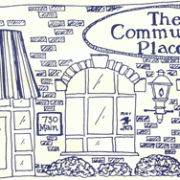A Fresh Look at World Missions
/6 Comments/in Discipleship, Evangelism, Ministry, Pastoral Resources/by gunnarBut God, who comforts the depressed, comforted us by the coming of Titus; and not only by his coming, but also by the comfort with which he was comforted in you, as he reported to us your longing, your mourning, your zeal for me; so that I rejoiced even more” (2 Cor. 7:6-7 NASB).
On June 25, 2007 I had been the pastor of Valley Baptist Church for about one month. We had grown from about 12 to 20 people at this point, when I invited young missionary family that was heading out to Mongolia to share at the church. Being married to an “MK” (i.e. Missionary Kid) world missions have become very important me and I want to build world missions in to the DNA of the church. At the end of the service I made a bold proclamation, “I can’t wait until VBC sends a team to Mongolia in five years!” I didn’t really know what I was saying, or if this little church would even survive five more years, but the proclamation would ultimately transform my understanding of my role in missions as a pastor.
Fast forward two years. This statement stuck in my heart. It kept me up at night. Would we send a team? How would this happen? I didn’t have the first clue. I started to think, “Man, ‘five years’ is approaching quickly. Maybe I need to go to Mongolia to take a ‘vision trip.’ I think that is what people do.” This thought scared me. As a former Navy SEAL I wasn’t too comfortable with a trip to a formerly control communist country that lies between Russia and China. This thought was crazy. I thought I would run it by my wife for her to shoot the idea down and to finally do away with this crazy thought. To my surprise, she replied, “That is a GREAT idea! I support you 100%!” Oh no, I was in trouble.
I prayed. I Skyped the missionary family to discuss this idea with them. All the doors were opening all together to fast for my comfort. Within a matter of months I booked my ticket to Ulan Batar, Mongolia via and over night stop in Beijing–a place where the church has some “friends” serving also. I ended up taking a man from the church with me on this journey. As we prayed and prayed about the purpose of trip, it became crystal clear that our purpose was for the sole purpose of encouraging the family who was serving overseas.
The goal of encouraging seemed a bit strange to me. I do not have the gift of encouragement and wasn’t sure that this goal was legitimate or valued in the eyes of the pastoral establishment. The idea of a senior pastor flying overseas is normally for the sake of evaluation–if one ever goes. But the more I prayed and the closer we came to the departure date, the more I realized I was going only to encourage.
I departed for Mongolia on April 19 and stayed there until May 5, 2010. In my mind the missionary family was encouraged already, but my purpose was to take them up a notch or two. I wasn’t ready to face the amount of discouragement they were facing. I spent the two weeks with their family experiencing Mongolian culture and enjoying some American treats that we brought with us–like tortillas, taco seasoning, pancakes, and a variety of other things Americans miss when they are away. We had a sweet time of fellowship and enjoying time together during my stay. At one point, the missionary told me, “Last night my wife said, ‘This is the first time I remember seeing you laugh in almost three years.'” This statement revealed to me how harsh missionary living is on the spirit.
Upon my return the thoughts to the trip lingered. I wrestled with the thought of missions today in the church in light of Scripture. It seems today we are about sending people out, giving money (which is great), praying for them (maybe, if we remember), and sending teams overseas a few times a year, but something just seems amiss to me.
Through this experience the Lord has shaped my understanding as a senior pastor concerning my role with world missions. Maybe these are just new thoughts for me? I hope they convict and encourage you. Here are a few things I have learned:
1. The missionaries we support are a part of my flock and I have a responsibility toward them as a shepherd. They are not staff that I am keeping accountable, but are saints doing the work of the ministry that God has called them to. My ministry is to help them on their journey even when they are gone (Ephesians 4:11-13).
2. Discouragement is real for missionaries. Look to the top of this post and read the verse. Seriously, read it. Paul the apostle was DEPRESSED and how did he get undeppressed? Titus came to him and spent time with him! Pastor, I encourage you to make an annual trip to visit a missionary. Encourage them by visiting, Skyping, email, and by any means that you can! I am so thankful that my church is on board with me visiting and encouraging our missionaries. My next stop is Florence Italy next month…
3. Missionaries are not forgotten if the pastor is in relationship with them. I can’t tell you how often our missionaries come up in my sermons, or in my prayers on any given Sunday. They are important to me and so I talk about them. By being involved with them, I can communicated to the church who they are and what they are doing. These are seeds that God will use.
4. God will stretch you through your going, thereby making the church healthier. I strongly believe the best way to keep you church healthy is by allowing God to stretch your faith. By going overseas and getting a shot of world missions, you will grow in your relationship with Him. When you grow spiritually your people will grow spiritually.
I strongly encourage you pastor to get your passport and go overseas and stay with one of your missionaries in the field (if you don’t have one, get one…I can help you). I guarantee that you and your church will benefit from this!
Paul’s Goals For the Church
/0 Comments/in Bible, Church Issues, Discipleship, Evangelism, Ministry, Pastoral Resources, Podcast/by chuck10 Things I Wish Someone Told Me About Church Planting
/6 Comments/in Bible, Call of God, Church Issues, Discipleship, Evangelism, Ministry, Pastoral Resources, Practice, Trends/by danielfuscoI often try and think about the things that I wish someone would have spoken to me about before I made a ton of mistakes. Yes, I grew from these mistakes and the Lord always brings beauty out of ashes, but if only someone would have told me certain things. Now that I think about it, it would be better aptly titled, ‘Things I Really Took to Heart Before Church Planting” as I’m sure some of these concepts I had heard about before planting.
These will be in no particular order. But here goes…
1. God is more concerned with the Minister than the Ministry.
I was shocked to realize that God was more concerned with the state of my heart than He was with the perceived success of the plant. I know a pastor who told me that the first five years was for the pastor’s growth, the next five years is for the fellowship’s growth. He even went so far to call his first church plant’s people ‘the poor practice sheep’. When God calls a man to go and plant a church, He loves that man enough to kill him. It often takes some time for us to realize, but God is more concerned with making the church planter like Jesus than He is in blessing the work. Don’t get me wrong, He’ll do an amazing work in the fellowship. But He’s more concerned with your growth, than the church’s growth.
2. Visit the Local Pastors, not the Local Churches.
It is important for a church planter to visit and meet the pastors in the area that he is moving into. I’ll speak in point 3 about the major pitfall of most church planters in this regard. But relationships with local pastors are invaluable. Those who have been in the area for awhile will have a unique perspective, an experiential perspective, about an area. You can learn from them. But don’t visit their churches. I would say even if they invite you, don’t go. Why? Because if you have a heart for people, you will build relationships with them and when they hear that you are going to plant in the area, some will want to come. And then the ‘sheep stealing’ discussion starts. Church planting is hard enough and the last thing you want is to get off on the wrong foot with people that you want to be close to. I made this mistake personally, so I know.
3. Don’t let your Calling Drive a Wedge between You and Other Pastors.
Almost all first time church planters make this mistake. I made a reference to this in my second point. Here’s how it happens… You sense God’s call to an area and you are rightfully excited. Upon your arrival, you are filled with ideas and vision. You meet with another local pastor and as you speak of your ideas, you make them feel as if they are in God’s doghouse. They will automatically resent you. An example of this is when a planter says something like, ‘God has called me here because He wants to see a Bible Church here’. That says to most people, ‘You are not a Bible teaching church.’ Humility is not learned, it is a consequence from being broken. Because He has broken you, you will be humble. So although you are just getting started, and you probably haven’t been broken much yet, try and respect your brothers who have been plowing the field that you are going to work in. Remember this, ‘You are not God’s gift to the area that you are called to! Jesus is. You are just an unprofitable servant doing what you were asked to do.’
4. Don’t even Think about Quitting for at Least 4 Years.
They say that 80% of church plants fail. Why? They fail for numerous reasons, I’m sure. I think one of the main reasons is that guys quit too soon. Before you even step out, you should be prepared to commit 5 years of your life to it. If God is calling you, what is 5 years anyway? As I said, you should not even think about throwing the towel in until you’ve been laboring for 4 years. It takes time for a church to get established (most people will say that a church is still a baby at 10 years old). God will work in His timing so be patient. I don’t have statistics to back it up, but I imagine of the 80% that fail, most of them shut the doors within the first few years.
5. The Attacks Will Come so Don’t Freak Out When They Do.
When the children of Israel left Egypt did they just coast to the Promised Land? Nope. They had attacks from the outside (the Egyptians and the Amalekites). They had attacks from the inside (Korah, the Golden Calf, the 10 scared spies, etc). The same holds true for the ministry of our Lord Jesus and the apostle Paul. The attacks will come. If you sign up for the front lines of a battle, don’t freak out when bullets start flying. When you are called to plant a church, you just signed up to be on the front lines, expect there to be issues. They will come from people on the outside and they will come from people on the inside. Expect them and when they arrive, don’t think it’s strange.
6. Before You Become the Senior (or Lead) Pastor, Be An Assistant Pastor.
I believe that this is so crucial and I am soo grateful for my training as an assistant pastor. In every field, you have to learn the ropes before you take the reins. As a doctor, you don’t just jump from Medical School into the Operating Room. First you do your residency. Same is true of business. The guy from the mail room never gets hired as the CEO. Never. Why? Because they first need to learn the ropes of business. I have found that the ministry is caught (much like a cold). I learned soo much from catching the ministry from my pastor. I learned things to avoid, ways to handle situations, how to gracefully let someone leave the church, how to handle a wounded sheep, etc. Most pastors who have never been Assistant Pastors normally hurt a lot of people because they need caught the ministry from another pastor. My advice would be, “If you want to be plant a church, get on staff at a church first.”
7. Get a Mentor, You’ll Need Him.
My pastor, John Henry Corcoran, told me before I left to plant the first church, that the next set of lessons that I need to learn can only be learned as the pastor. But once you step on out, you are in uncharted territory. You want and need someone who you can bounce ideas off of. You want to have someone who can say to you, ‘Whatever you do, don’t do that.’ I did that once and …’ You’ll also need someone who can support you personally. Once you step on out, the enemy will be gunning for you like never before. You need accountability as most church planters feel isolated from people. Make sure that you have someone who will ask you the hard questions and keep your struggles and issues before the Lord.
8. The Key to Church Planting – Discipleship
There are a small percentage of church plants that take off like wildfire. Most of them are slow going. Like Jesus, discipleship is the key to building the kingdom. Discipleship involves relationship and relationship takes time and energy. You need to pour into the people that God has brought to you. You need to be available and open with them. You need, like the apostle Paul, to be a poured out offering. Discipleship builds solid churches.
9. Beware of Friends and Family Who Want to Help with the Church Plant.
I know, this statement is a bit shocking. I have found from my own experiences and in talking with many other pastors that one of the biggest hindrances to a pastor’s joy is the well meaning friends and family members (extended) who want to be involved. I often tell men to discourage their close buddies and families members from being there at all in the early stages.
10. Make Sure That You Keep Feeding Your Soul.
For most church planters, they are used to going to church. Even if you are in service at the church, you are often hearing the Word taught a few times a week. Once you step out, you need to make sure that you are still sitting under the teaching of the Word. I have found that the best way to do this is to pick a ‘Pastor’ for the next three months. It can be anyone you want. But listen to a few Bible studies a week from a certain pastor. Maybe study through a book or sermon series with a certain pastor. As I am writing this, I am presently studying through the book of Colossians with Pastor Tim Brown of Calvary Chapel Fremont and am being absolutely blessed and convicted. If you let this lapse, you will sense the leanness of your soul.
Prep-time Verses People-time
/2 Comments/in Bible, Call of God, Culture, Discipleship, Evangelism, Ministry, Pastoral Resources, Practice/by gunnarI solemnly charge you in the presence of God and of Christ Jesus, who is to judge the living and the dead, and by His appearing and His kingdom: preach the word; be ready in season and out of season; reprove, rebuke, exhort, with great patience and instruction. (2 Timothy 4:1-2)
My greatest battle every week is over time spent between the study and with people. I don’t know about you, but my week begins on Monday morning and builds pressure until Sunday after I preach my last sermon. Monday’s seem to consistently bring remorse over not studying the Word enough in preparing for the previous Sunday, or on the other end of the spectrum, feeling like I have not spent enough time out amongst the flock shepherding. I don’t know that this tension can be resolved, but we must strike a balance in managing the tension between these two very importance responsibilities.
All of the Bible is important, but there is just something very relevant about Second Timothy for pastors. Seriously, Paul is facing imminent death and these are his last words to the young pastor Timothy. In the above passage Paul essentially charges Timothy in the presence of God to (1) preach the word and to (2) minister to people with patience. I take this charge personally with great conviction and I would like to share how I try to apply this passage to my life from week to week.
Preaching the Word is priority number one for me.
I deeply believe it is the Word of God that changes lives. The state of the pulpit worldwide is poor when it comes to preaching. I don’t want to sound arrogant, or like my preaching is a finely oiled machine, but I attended a lot of church growing up and learned nothing from the Bible or about the Bible. It wasn’t until I was an adult that I finally sat under men who taught the Bible with conviction and life did I come to know Jesus as Savior. I was ultimately discipled in my walk with Christ through the expository preaching of these men. This reality drives me each week to teach the Word faithfully, with clarity, and passionately.
Over the last few years, I have found some things that have been helpful for me in preparing to preach while shepherding the flock God has entrust to me:
1. Pray consistently about the message and text you are about to preach and teach. I find myself constantly asking God, “What did this mean in context then? What practical principles apply today? Lord, help me!”
2. Study, study, study. You can not shortcut this step. While this is not a post about how to study, I will say you need to study the language and grammar, the historical context, and the context of the text. The text you are teaching on the next week and weeks ahead should so be in you that it invades your thought life almost nonstop throughout the week. Without adequate study, you will not be able to handle the Word rightly. This saying is so true, “Where there’s a mist in the pulpit, there’s a fog in the pew.” The bottom line is you must understand the text through and through if you are going to teach others.
3. Preach a book of the Bible at a time! I am all about preaching in an expository manner as it provides spiritual food for those in your church. It also helps that you don’t have to figure out what you are going to preach, you just have to figure out how to preach the text in front of you the coming week! In many ways this frees up your time to focus on studying, rather than flipping through your Bible hoping you feel inspired to preach something.
4. Front load your studying in order to prepare for the inevitable crisis that will come. Starting Sunday I start saturating my world with the Scripture I am about to preach on the following week. Bible CD’s in my car, sermons from other men who have preached the text, Bibles and commentaries lying around all over my house. Starting Sunday I intake as much of the text as I possibly can. By front-loading my study I have it tinkering around in my mind and heart ultimately freeing me to respond and reach out to the people around me.
People should always be the priority!
I am chasing a deadline trying to get this post submitted. “Stuff happened” last week that put me behind in the blogging category. I have VBS this week and my routine is off kilter to say the least! There are times when I want to shut off my cell phone, ignore my emails, and lock myself in my study all week long, but I don’t think this is what Jesus wants from me. Because this week has required a lot of people time, I fear I am going to drop the ball on the las half of this post.
1. Pastoring is about people. My goal as a pastor is defined in Ephesians 4:11-13 and it is simple–to equip the saints for the work of the ministry. When I look at the passage at the top of this list I am to reprove, rebuke, and exhort with great patience. I don’t know about you, but I don’t feel comfortable reproving, rebuking, or exhorting total strangers, but I can do this with people I know and love. I think the point is that we are to be deeply entrenched in the lives of those we serve. It takes time…notice we are told to do these things with great patience, not with great frustration.
2. Your life is the most powerful message you preach. My philosophy as a pastor is to preach with transparency. I air my dirty laundry on a regular basis. This is intentional. I am not up on a pedistal, but am walking this life as a “sinner saved by grace” just like everyone else in my church. I love walking alongside the people God has called me to minister as it exposes my life with Jesus–my victories and struggles alike. Paul the apostle preached a lot, but I think his life was his most powerful message. My desire is to say the same thing to my people as Paul said to his, “Be imitators of me, just as I also am of Christ” (1 Corinthians 11:1, NASB). I think Paul could say this to them because his people knew him…just like I want mine to know me.
3. “Good things happen when you’re out.” This a saying we had at my last church. The point is simple. When you are out in the community amongst your culture good things happen. As a pastor you should know your culture and community around you. It is all too easy for us to get sucked into our little Christian bubble and to loose connection with reality around us. To guard myself from isolation am intentional about being out through a variety of avenues like the local Kiwanis, law enforcement chaplaincy, serving on the local cemetary board of directors, and meeting people from the church at Starbucks instead of my office. It is hard to quantify the benefits that come to you, your preaching, your church, and your community when you as the pastor make time to be out amongst the community, but the fruit in my ministry from this has been great.
The tug-o-war where both sides must win.
We pastors do not punch in on time clocks. For the most part we control how our time is used or wasted. We must study to deliever sound relavant biblical messages that impact lives. We must be out amongst the flock if we are indeed shepherds. We must finish well with both these priorities. I have shared what works for me for know. I would love to hear what things work well for you in juggling these two priorities!
Guest Contributor – David Guzik “We gain far more in Christ than we lost in Adam”
/0 Comments/in Bible, Call of God, Church Issues, Discipleship, Evangelism, Ministry, Pastoral Resources, Random Tangents, Revelation, Social Responsibility/by danielfuscoThis post is a response to a question that I posed to David Guzik. He graciously allowed me to post it as it was a great response.
I sent David a question based on something I saw tweeted that he had said.
“We gain far more in Christ than we lost in Adam.”
I asked David, “Is this true? Can you riff on this a bit for me?”
Here is David’s response-
Most of us think that the ideal world is the world of innocence, where sin or even have never been experienced. But God seems to place a greater value on the world of redemption.
Adam was certainly innocent, in the sense of not knowing good and evil (Genesis 3:22). But he was not righteous, in the sense of having fulfilled all of God’s law. Jesus came as the second Adam (Romans 5:12-21), and perfectly fulfilled the will and law of God with His obedient life. This positive righteousness of Jesus is credited to the believer by faith (Romans 3:21-22, Philippians 3:9). This is something greater in Jesus than Adam never had.
We also don’t have any evidence that Adam was regarded as an adopted son of God, but the believer is in Jesus (Ephesians 1:5, Galatians 4:5).
We are named kings and priests before God (Revelation 1:6, 5:10) – Adam never was.
We are part of a glorious community that Adam never knew, a community that will be consummated in the New Jerusalem (Revelation 21:1-3). Man has never known a community unmarred by sin. Adam and Eve only knew a limited community, and community in a larger context only came long after the Fall. Here, in the New Jerusalem, we have something totally unique: a sinless, pure, community of righteousness, a holy city.
In Ephesians 1:9-12, Paul wrote of the mystery of His will that has been made known to us. What is it? That in the dispensation of the fullness of the times He might gather together in one all things in Christ. A critical aspect of God’s plan of the ages is to “sum up” or resolve everything in Jesus. In a sense, we could say that God glorifies Himself by allowing a problem and showing His wisdom in not only solving the problem, but in making the end result greater that the prior condition.
I see a wonderful consummation of all this in Revelation 21:5: Then He who sat on the throne said, “Behold, I make all things new.” And He said to me, “Write, for these words are true and faithful.”
This is an authoritative announcement, coming from the throne of God itself: He who sat on the throne said. In this announcement, He says: “Behold, I make all things new.” This statement is in the present tense, “I am making everything new.” Revelation 21:5 marks the consummation of God’s work of renewal and redemption, having begun here and now in our present time.
The words “All things new” connect with the thinking behind God’s eternal plan – to allow sin and its destruction in order to do a greater work of making all things new. At this point in His plan of the ages, the plan is complete. All things are new.
Our instinct is to romantically consider innocence as man’s perfect state, and wish Adam would have never done what he did. But we fail to realize that redeemed man is greater than innocent man; that we gain more in Jesus than we ever lost in Adam. God’s perfect state is one of redemption, not innocence.
A few days later, David added this quotation to an email
Today I was reading some Spurgeon, and methinks I have a great quote from him about this very topic:
“You have been a gainer by Adam’s fall. You might almost say, as one of the fathers did, O beata culpa, ‘O happy fault,’ which put me into the position to be so richly endowed as now I am! Had you stood in Adam, you had never been able to call Jesus “Brother,” for there had been no need for him to become incarnate; you had never been washed in the precious blood, for then it had no need to be shed. Jesus has restored that to you which he took not away. He has not merely lifted you from the dunghill to set you among men, but to set you among princes, even the princes of his people. Think of the bright roll of promises, of the rich treasure of covenant provision, of all that you have already had and all that Christ has guaranteed to you of honor, and glory, and immortality, and will you not in the midst of the congregation praise the Lord?” (Jesus, the Example of Holy Praise)
Wow. I love that: You have been a gainer by Adam’s fall …. O beata culpa …. Jesus has restored that to you which he took not away.
No wonder that God had to tell John, “Write, for these words are true and faithful.” John was probably so astounded by these words that he forgot to write – and must be told to do so.
That’s how it runs through my mind. To me, it is just plain glorious.
Cultural Shift – Part 2
/10 Comments/in Culture, Evangelism, Ministry, Trends/by debenm[dropcap3]M[/dropcap3]inistering in a theistic environment is relatively easy. Relatively easy in the sense that the you, and the person to whom you are ministering, are playing from the same deck. When you ask, “Can I pray for you?” there’s likely a common understanding about prayer. When you speak about God you can assume that your hearer has a similar concept of God. Religious people with a similar [theistic] worldview are generally more receptive to the gospel, thus “large-scale” evangelism can be effective.
Evangelism in America for several generations had been anything but cross-cultural. For many, “cross-cultural evangelism” has been the equivalent of “foreign missions.” That is simply no longer the case, and contextualization of the gospel is now commonplace for evangelism in our own backyard. There are however some problems. “Contextualization” seems foreign to most ministers over 40. The mainline church is still [largely] relying on evangelistic tactics that are oriented toward a theistic worldview, and expecting receptiveness to the gospel like what you’d hope for among theistics (if I can make up a word).
At the close of 2008 I began teaching through the book of Acts at Calvary Escondido. Six months later, as we came to chapters 10 & 11, I was struck by how the move of the gospel from Jerusalem, Judea and Samaria, to the “uttermost parts” – or the Hellenistic Roman world – mirrored the shift of culture the church is now facing in 21st century America. In many ways we’ve reverted to a 1st century mindset and culture in the west. How’s that for progress? This is incredibly foreign for the western church, as it has not experienced such an environment for centuries. This epic shift has given rise to the term “Post-Christian,” which strikes great fear into the hearts of masses of evangelicals.
 The first week of April, 2009, Newsweek’s cover featured the headline “The Decline and Fall of Christian America.” John Meacham’s provocative article “The End of Christian America” got more than a little rise out of many in the Christian community. A year prior, in February, 2008, The Pew Forum released it’s nearly 150 page “Religious Landscape Survey.” Pew’s survey of more than 35,000 Americans explored this religious and cultural shift; it was, in many ways, the catalyst for Meacham’s article and Newsweek’s cover.
The first week of April, 2009, Newsweek’s cover featured the headline “The Decline and Fall of Christian America.” John Meacham’s provocative article “The End of Christian America” got more than a little rise out of many in the Christian community. A year prior, in February, 2008, The Pew Forum released it’s nearly 150 page “Religious Landscape Survey.” Pew’s survey of more than 35,000 Americans explored this religious and cultural shift; it was, in many ways, the catalyst for Meacham’s article and Newsweek’s cover.
Post-Christian. This is the cultural landscape of 21st century America; and Western Europe for that matter (Europe is actually far further down the path). Christianity and the “Christian worldview” are no longer the default in America. Some staunchly hold that America is a Christian nation and consider it their call to defend [politically] “Christian America.” Every time I am confronted by this mindset, I am reminded of Jesus’ words to Pilate, “If My kingdom were of this world, My servants would fight… My kingdom is not of this world.” (John 18:36, emphasis mine) Perhaps we’d do well to actually read those bumper-stickers that are so trendy among evangelicals today.
Why does this reality seem to frighten us so much? Have we totally forgotten that the world in which Peter, John, Paul, Barnabas, Silas, Timothy, Titus and many others ministered was wholly non-Christian by the very fact that it was pre-Christian? Do we honestly [and arrogantly] believe that America is the last hope for the Christian faith? Look at the statistics, Christianity is not slowing it’s pace of growth in the least. Sure, it may be growing fastest in places other than America and Western Europe, but the Christian faith is not in decline, even in the west.
What then is in decline? To answer that we’d have to ask, “What exactly is “Christian America?”” I believe that “Christian America” has actually meant “Christian Consumerism,” or if I can make up another word, “Consumeranity.” If that is dead or dying, may it be that the DNR is signed and notarized.
Certainly the long way about it, but what exactly is the point for 21st century evangelism in America? Clearly it’s going to look different than it has, but it’s going to be more like it was, as in the days of Paul.
Large scale “crusade evangelism” may still have a place [for a time]. However, most who attend crusades are already theistically minded. They are, for lack of a better analogy, the low hanging fruit. Paul did seek such individuals in his evangelism. Always when he entered a new city he searched for the synagogue; he first desired audience with the Jews and gentile god-fearers. Ultimately he would endeavor to reach the unreached; the paganistic, polytheistic, pluralistic Roman mind.
Evangelism with Romans involved contextualization and more explanation; and uptake, or receptiveness to the gospel was on a much smaller scale. Roman’s were skeptical and suspicious. At Athens in Acts 17 there were a few who were open, but most mocked and dismissed Paul’s defense. This is what I believe awaits the evangelist of our day; skepticism, suspicion, mocking and dismissiveness. Add to this, they, the modern day lost, are not going to come to us; we must meet them in the marketplace, outside the structure of the church.
These may be changes from the norm of Christianity in America, but the reality is that what we’ve experienced in America has not been normal to Christianity. American Christianity for the last hundred years (or more) has made abnormal, normal. So much so that we’ve lost sight of the fact that every Christian is called to be an evangelist on mission. We have exalted a few key leaders as evangelists and cast on their shoulder the burden of the task. The harvest is white and the few laborers are bound to grow weary unless we reengage the body as a whole.
The Apologetics of Homosexuality
/28 Comments/in Bible, Church Issues, Culture, Discipleship, Evangelism, Ministry, Pastoral Resources, Practice, Social Responsibility/by danielfuscoThere is little doubt that Christianity and Homosexuality seem to be at odds with one another. The Christian belief that homosexuality is a sin and their refusal to advocate same-sex marriage has the Christian church dubbed zealots, bigots and homophobic by the homosexual camp. The rhetoric is loud and divisive on both sides. There is a massive chasm in both beliefs and mutual understanding. This makes a toxic environment to say the least. This toxicity begins to spill into the public forum with the debates, discussions and voting on the legality of same-sex marriage.
For a few decades now, Christians have congregated in churches and taught the Bible. Homosexuals formed like-minded communities and in like manner were built up in their beliefs. These two groups spent little time intersecting or interacting. But with the rise of the discussion about same sex marriage and its national exposure, these groups are now intersecting all the time. The problem seems to be that they aren’t interacting much. There is much bigotry on both sides of this very complex issue. What is most needed is mutual understanding. This short paper is an attempt at beginning a civil, although packed with emotions, dialogue on the discussion.
I am a pastor of a Christian church. I believe that the Bible is God’s word and that it is both inerrant (without the capacity for error) and infallible (without error). I believe that God says what He means, using human authors, and means what He says. Because of this, I believe, and the Bible clearly teaches, that homosexuality is an action that is in rebellion to the plans and purposes of God. In other words, it misses the mark of God’s view of perfection and it is properly termed a sin. I also have many, many friends who have same sex attractions. Some, because of their beliefs, have chosen not to act on those attractions and would say that they live lives of joy. Others, because of their beliefs, have chosen to act on those attractions and would say that they live lives of joy. These men and women are people whom I love and respect. We work hard, albeit uncomfortably at times, to maintain relationships although we disagree on fundamental things. There is love and mutual understanding. We love each other but we do not agree with each other on different things.
My goal is to write this out in such a way as it can be read in one sitting. So my aim is not to be exhaustive but to bring out the most basic questions. It is my hope to facilitate discussion and mutual understanding between the two groups. It is also my hope to give a nuanced view of why Christians view homosexuality as a sin and to propose a way to navigate the lack of civil rights afforded to those seeking government approval for same sex unions.
The Bible and Homosexuality
There are extensive writings about the Bible and homosexuality. From Genesis to Revelation, spanning the entire Old and New Testaments, homosexuality is portrayed as ‘a sin’ (an act that misses the mark of God stated perfection in how humanity should conduct itself). No one denies this. Many people seek to handle these verses in different ways but no one can deny that ‘homosexuality is a sin’ is in there. Whether in Genesis with the narrative of Sodom, in Leviticus with homosexuality capital punishment laws, or in the writings of Paul or the Revelation, the Bible says what it says. So I don’t think it is time worthy to go into each of these passages and discuss them because, at least for me, it is a foregone conclusion as to the Biblical teachings on the subject.
So what are we to do with such a teaching? Most often the attempt is to argue away the validity of the teaching based on personal experience or accusations of judgmentalism. So let’s look at each of the most basic arguments.
Argument #1 – The Natural Affections Argument
This argument looks something like this. “For as long as I can remember, I have always been attracted to people of the same sex”. In essence, the argument is that my natural affections have always pointed that way. Because this way comes naturally then it should not be a problem. This is also extended to the “I love this person”.
Biblically speaking, this argument is exactly the reason that Jesus came to the earth, died on a cross and rose again. The teachings of the New Testament make the case that our natural affections are by default in rebellion against God. Sin is the norm. Sexuality is morally neutral in a vacuum. Humans are sexual beings by nature (whether by design or evolution depending on your viewpoint). The problem is not sexuality but how a human heart handles sexuality. Homosexuality and heterosexual immorality are handled the same way in the Bible. So sexuality is not the problem. The problem is that if humanity’s default is be in rebellion against God then humans tend to handle their sexuality in a way that is in rebellion against God as well. So the Bible teaches our natural affections are exactly the problem. People are naturally selfish (ever see two two-year olds fight over one toy in a room full of playthings). Selfishness is a sin as well. No one teaches a child to be selfish. That comes naturally and is exactly the problem.
Argument #2 – The Judgment Argument
This argument looks something like this. “Who are YOU to tell me who I can and cannot love?” This is the natural affection argument is used in regards to someone’s ability to limit the activities of someone else. This is where laws come into play in this discussion (and we will look at that separately in a moment). But the idea here is that it is wrong and judgmental for someone to tell someone else how to live. There is both validity and absurdity in this argument. I will discuss in a moment the validity side of this argument because in a free country, as long as the country deems that no one is being hurt, you cannot tell someone who they can and cannot love. Again, more on that in a moment. But the absurdity side of the argument is this. Freedom with the absence of any constraints is anarchy (which is radically constraining). True freedom is not living with an absence of restraints but living only with enough restraints to let them be truly free. A simple example is this. If a family lived in a house where their backyard is adjacent to a major highway, would the parents just let their children go out and play anywhere they want? No, they would put a fence around their property. Their children are then free to go and play in the backyard and express their childhood curiosities. But, the parents made a judgment to limit their children’s freedom (by putting up a fence) so that their children can have true freedom (the ability to express themselves without being harmed). So true freedom is not the absence of all constraints but instead enough constraints that there be an absence of destruction.
Argument #3 – The Loving God Argument
This argument looks something like this. How can a loving God not allow people to express their love in a way that seems natural to them.
Now on the Christian side of the discussion, other than using the Bible teaches it argument, there is two major arguments.
Christian Argument #1 – Natural Law
This argument is simply that homosexuality is against nature. This point is argued in a few ways. 1) Men have penises and women have vaginas. Penises emit semen. Ovaries produce eggs. The semen meets the egg and fertilizes it. You get the picture. This biology works simply and effectively. 2) That if took every homosexual and put them on an island (which I would NEVER advocate), without the help of technology or partner swapping, there would only be the present generation and no additional generations. The act itself goes against the evolutionary impulse of natural selection. There are other nuances to this argument but you get the picture.
Christian Argument #2 – Spiritual Blindness
This argument is that humans do not know the extent of their errors until God’s Holy Spirit illuminates it in their hearts. This argument is not specific to homosexuality at all, but is general to all of humanity. Humanity does not know the extent of their depravity until God’s light shines into man’s darkness. For me, I didn’t realize how selfish and destructive my sexual relationships with women were until God’s Spirit revealed them to me. I was a ‘normal’ American teenager; enjoy all the excesses of collegiate life. I was just doing what everyone else was doing. But when God’s Spirit illuminated my heart, I realized how wrong I had been. My conversion only began the process of my realizing the extent of my spiritual blindness. All humans suffer from spiritual blindness and lack an authentic understanding of the spiritual, social, emotional and physical implications of our decisions.
Homosexuality, Religion and Politics
Now we come to what has brought this issue into the forefront – the intersection of homosexuality, religion and politics in the American public square. The touch point for this issue is same-sex marriage. Most often this is seen in light of the separation of church and state. Even the language shows how much America has changed since the writing of our constitution. Today it would have to be seen as the separation of faith and state (or else you could argue that you don’t have to separate mosque or synagogue and state). In essence, the government is not allowed to impose a state mandated faith belief on the people. We are all excited about this. The government can not impose itself on a person’s personal interiority.
Here’s the problem though. This has become more of a debate about traditional religion and the state. But so many moral judgments, from whatever camp it comes from, are faith-based beliefs. Sure, they may come from non-traditional sources but they cannot be scientifically verified. Even secularism is a faith-based belief. The reality is that no one divorces his or her ideas about morality from some sort of faith-based belief (even if it is the faith-based belief against having faith). So in essence, everyone brings his or her beliefs into the public square. Not just the religious but the irreligious as well. No one ever leaves his or her religious (traditional or nontraditional) beliefs outside of the public square. So any side of any argument is the seeking of people to legislate their faith-based assumption on the morality of any issue.
With that being said, we have a level playing field. All people argue the validity of their position from a position of faith, seeking to win over society to their way of evaluating and seeing the world. Because of this, we have a divided nation.
Saturday Reflection #2 – Michael Frost – The Purpose of the Church
/4 Comments/in Bible, Call of God, Church Issues, Culture, Discipleship, Evangelism, Ministry, Pastoral Resources, Practice, Random Tangents, Revelation, Social Responsibility, Trends/by danielfusco
Michael Frost can be controversial. What do you think? Is he correct?
Saturday Reflection – Biblical Shalom
/0 Comments/in Bible, Church Issues, Culture, Discipleship, Evangelism, Ministry, Pastoral Resources, Practice, Revelation, Social Responsibility, Trends/by danielfusco“We call it peace, but it means far more than mere peace of mind or a cease-fire between enemies. In the Bible, shalom means universal flourishing, wholeness, and delight, the webbing together of God, humans, and all creation in justice, fulfillment, and delight. It’s a rich state of affairs where natural needs are satisfied and natural giftings are fruitfully employed all under the arch of God and in His love. Shalom, in other words, is the way things ought to be.” (Cornelius Plantinga, Not the Way It’s Supposed to Be: A Breviary of Sin, [Eerdmans, 1995] p. 10)









